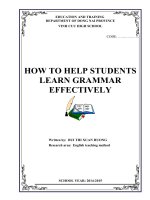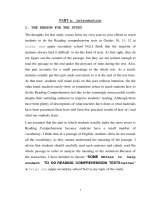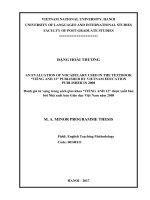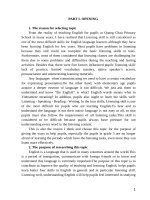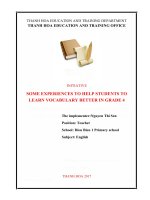Some ways to help students learn vocabulary effectively in the textbook “tieng anh 11”
Bạn đang xem bản rút gọn của tài liệu. Xem và tải ngay bản đầy đủ của tài liệu tại đây (99.89 KB, 16 trang )
THANH HOA EDUCATION AND TRAINING DEPARTMENT
THACH THANH 1 HIGH SCHOOL
XPERIENTIAL INITIATIVE
SOME WAYS TO HELP STUDENTS LEARN
VOCABULARY EFFECTIVELY IN THE TEXTBOOK
“ENGLISH 11”
Author
: Mr. Le Hong Ngoc
Occupation : Teacher
Experiential initiative on: English
TABLE OF CONTENTS
THANH HOA, YEAR 2019
Page
1. INTRODUCTION.
1.1. Reasons for the study
1.2. Aims of the study
1.3. Object of the study
1.4. The methods of doing the research
02
02
03
03
03
2. STUDY CONTENT
03
2.1.Theoretical rationale of the study
03
2.2. How to learn vocabulary effectively in the textbook Tieng Anh 11. 03
2.2.1. Choose a theme.
03
2.2.2. Write English phrases.
05
2.2.3. Pick up related English words:
07
2.2.4. English words with the same root:
08
2.2.5. Make up example sentences with each word on the list.
09
2.3. Study effects
11
3. CONCLUSION, PROPOSALS
3.1. Conclusion
3.2. Propossals
12
12
13
2
1. THE PURPOSE OF THE CHOSEN SUBJECT.
1.1. Reasond of the the study.
Vocabulary is the most fundamental factor in learning English. Almost every
skill in English learning process requires students to have good vocabulary. The
more words students know, the more they will be able to understand what they
hear and read, the better they will able to say what they want to express when
speaking and writing. Moreover, vocabulary is necessary for building up a good
command of the language. Without good vocabulary, it is likely that students
can’t use English correctly and confidently. It is the first and most important
aspect for students to master English before they improve their language skills.
Vocabulary is essential for language comprehension and expression. It can be
used as an instrument to measure students’ language ability as well as their
fluency. In short, vocabulary is the core of learning English and learning
vocabulary is an integral part of learning a language.
However, it is not easy for students to gain vocabulary at all. Most students in
general and the students of my school at Thach Thanh 1 high school in particular
have the same question “How do we study vocabulary more efficiently and
effectively?”. They often say vocabulary is hard to learn by heart and easy to
forget. Also, it’s difficult for many students to cope with using the words which
they have learnt. Students may find some words confusing and don’t know how
to use them in some contexts correctly. They also can’t remember new words,
even after they have learnt them several times and so on. Honestly speaking, it’s
not easy to improve their vocabulary, nor is it quick. But it’s entirely doable and
learning vocabulary is not different from any other skills. They simply need to
try their best to practise it regularly and know how to learn vocabulary
effectively.
Thus, Owing to the necessities, I have made up my mind to choose “ Some ways
to help students learn vocabulary effectively in the textbook “Tieng Anh 11” ”.
as my topic of the study.
1.2. Aims of the study
3
With the above mentioned reasons in mind, I have the specific aims as follows:
1.2.1. Helping students improve the skills of learning vocabulary.
1.2.2. Encouraging students to confidently cope with this type of problem in
order to learn words by heart more effectively.
1.2.3. Making student be aware of the importance of vocabulary in English and
motivate them practice learning vocabulary
1.3. Objects of the study
In this research, I just pay attention to the 11 th grade students at Thach Thanh 1
high school, especially the students in class 11B4 and 11B6.
1.4 The methods of doing the research:
+ Read textbooks as well as other documents.
+ Learn experience from the colleagues.
+ Do some experiments - make statistics - consider the results.
2.STUDY CONTENT:
2.1. Theoretical rationale of the study
+ Learn important words relating to the subjects they are studying.
+ Learn the words you read and hear again and again.
+ Learn the words you know and you often want to use frequently.
+ Do not learn the words that are rare or not useful.
2.2, How to learn vocabulary effectively in the textbook Tieng Anh 11.
2.2.1, Choose a theme.
This is the first step, students should select which theme they want to learn
vocabulary, for example they can choose food, transport, ...This is very powerful
because whenever they remember one English word, they will also remember all
the other words they found with it.
For examples:
UNIT 1: FRIENDSHIP
The theme: Qualities of friendship:
+ unselfishness(n)
+ two-sided affairs(n)
+ loyalty(n)
+ loyal(adj)
4
+ give and take(n)
+ suspicion(n)
+ constancy(n)
+ trust(n)
+ constant(adj)
+ sympathy(n)
UNIT 4: VOLUNTEER WORK
The theme: volunteer
+ Take care of the sick/ the old-aged
(verb phrase)
+ Read books
(verb phrase)
+ Visit the aged, the orphans
(verb phrase)
+ Play games with the orphans
(verb phrase)
+ Listen to the problems
(verb phrase).
+ Clean up the house of the aged and sick
(verb phrase).
+ Do the shopping
(verb phrase)
+ Mow their lawns
(verb phrase)
+ Take the boys to baseball games
(verb phrase)
+ Help disadvantaged or handicapped children (verb phrase).
+ Give care and comfort
(verb phrase)
+ Provide education for children
(verb phrase)
+ Organise short trips
(verb phrase)
UNIT 11: SOURCES OF ENERGY
The theme: Sources of energy.
+ Fossil fuels: oil, coal, natural gas, limited, exhausted
+ Nuclear energy: electricity, dangerous
+ Geothermal heat: deep inside the earth
+ Wind energy: windmills, sailboats, clean, lots of
+ Water energy without pollution, dams.
+ Solar energy: sun, solar panels, roof, heat, cool, plentiful, infinite, clean and
safe
UNIT 12: THE ASIAN GAMES
The theme: sports events.
+ basketball
(n)
5
+ cycling
(n)
+ football
(n)
+ aquatic sports
(n)
+ athletics
(n)
+ weightlifting
(n)
+ boxing
(n)
+ shooting
(n)
+ wrestling
(n)
+ tennis
(n)
+volleyball
(n)
+ table tennis
(n)
+ hockey
(n)
+ squash
(n)
+ rugby
(n)
+ fencing
(n)
+ mountain biking (n)
+ bodybuilding
(n)
+ billiards
(n)
+ karatedo
(n)
2.2, 2. Write English phrases.
Generally, teachers explain the meaning of new English words and ask students
to note them down, then learn them by heart, but here I'm interested in teaching
English phrases containing the new English words. So, when students recall the
new words, they will remember the whole phrase. Most of my students have rich
vocabulary in their mind but they can’t know how to use them smoothly because
they just learn given respective words in their notebooks. So, they should
remember English phrases along with related examples
For examples:
UNIT 2: PERSONAL EXPERIENCES
The theme: experiences
6
1. my embarrassing experience
2. a floppy cotton hat
(noun phrase)
(noun phrase)
3. a sneaky look
(noun phrase)
4. be busy imagining
(verb phrase)
5. a wad of dollar notes
(noun phrase)
6. make a fuss
(verb phrase)
7. extremely excited
(adjective phrase)
8. a schoolboy about my age
(noun phrase)
UNIT 8: CELEBRATIONS
The theme: holiday
1. a main holiday
(noun phrase)
2. the grandest and most important occasion (noun phrase)
3. agrarian people
(noun phrase)
4. a great deal of excitement
(noun phrase)
5. be full of goods
(verb phrase)
6. traditional foods
(noun phrase)
7. ripe deep orange fruits
(noun phrase)
8. special foods
(noun phrase)
9. sticky rice
(noun phrase)
10. green beans
(noun phrase)
11. fatty pork
(noun phrase)
12. positive comments
(noun phrase)
13. various forms of entertainment
(noun phrase)
UNIT 15: SPACE CONQUEST
The theme : Space
1. at a speed of 17,000 miles per hour
(noun phrase)
2. in weightlessness
(noun phrase)
3. historic flight
(noun phrase)
4. enormous uncertainties
(noun phrase)
7
5. extreme changes in temperature
(noun phrase)
6. psychological tension
(noun phrase)
7. a technical failure
(noun phrase)
8. safe flight
(noun phrase)
9. a tragic accident
(noun phrase)
10. in a plane crash
(noun phrase)
11. on a rountine training flight
(noun phrase)
12. national hero
(noun phrase)
2.2.3, Pick up related English words:
What does it mean? well this means when students find a new word, they will
try to find groups of words that come with it. It is also called word trees. For
example: if they talk about a hotel, they can add "room, bed, check in, check
out, ...". This makes them easy to remember the related words.
For examples:
UNIT 3. PARTY
1. birthday: ages, family, friends, party, birthday cake, candles, cake and ice
cream, birthday cards, presents, toys, clothes.
2. wedding anniversary: silver anniversary, golden anniversary, married couples,
husband, wife, family, friend, party, cake, cards, gifts, flower, relationship,
happy and lasting.
UNIT 6. COMPETITIONS
competitions = contest: representative, members, school, class, English teacher,
students’ parents society, rules, activities, questions, answers, worksheets,
judges, performance, time, results, score, winner,enjoyment.
2.2.4. English words with the same root:
This is also very powerful, and very easy but students can skip it if they don't
know or they don't find words. It consists of finding other English words that
have the same root (noun, adjective, verb, adverb…)
For examples:
UNIT 9: THE POST OFFICE
8
1. to equip(v) →equipping(v-ing)→equipped(p.p)→equipment(n)
2. (to) advance(v)(n)(adj)→advancing(v-ing)→advanced(p.p/adj)
3. technology (n)→technologist(n)→technological(adj)→technologically(adv)
4. spacious (a)→spaciously(adv)→spaciousness(n)
5. please (v)→pleasant (adj)→pleasantly (adv)→pleasantness(n)
6. thoughtful (adj)→thoughtfully(adv)→thoughtfulness(n)
7. courteous(adj)→courteously(adv)→courtesy(n)
8. compete(v)→competitive(adj)→competitively(adv)→competitiveness(n)
9. useful(adj)→usefully(adv)→usefulness(n)
10. transmit(v)→ transmitting(v-ing)→transmitter(n)→transmission(n)
11. convenience(n)→convenient(adj)→conveniently(adv)
UNIT 13: HOBBIES
1. accomplish(v)→accomplished(p.p/adj)→accomplishment(n)
2. succeed(v)→success(n)→successful(adj)→successfully(adv)
3. accompany(v)→accompanying(v-ing)→accompanist(n)→accompaniment(n)
4. modest(adj)→modestly(adv)→modesty(n)
5. beautify(v)→beauty(n)→beautiful(adj)→beautifully(adv)→beautician(n)
6. collect(v)→collection(n)→collector(n)→collective(adj)→collectable(adj)
7. occupy(v)→occupied(p.p/ adj)→occupier(n)→occupancy(n)
8. regular(adj)→regularly(adv)→regularity(n)→regularize(v)
9. avid(adj)→avidly(adv)→avidity(n)
10. guitar(n)→guitarist(n)
2.2.5. Make up example sentences with each word on the list.
Just reading the word or memorizing it is not enough, at least not in most cases.
But using the new word in sentences of your own, can really take you one giant
step forward. Try it yourself, and see the results.
For examples.
UNIT 7. WORLD POPULATION
1. The word: population(n) - all the people who live in a particular area, city or
country.
9
Students can make up some example sentences.
- The world population is increasing faster and faster.
- Vietnam has a population of nearly 96 million.
- Governments are controlling population growth.
2. The word: support (v)-provide everything necessary so that someone can live.
Students can make up some example sentences.
- The Earth has enough resources to support many people.
- She supported her husband through many difficult times.
- The atmosphere of Mars could not support life.
3. The word: reach (v)- increase to a particular level, speed, etc. over a period of
time.
Students can make up some example sentences.
- Daytime temperatures can reach 40 oc.
- The conflict has now reached a new level of intensity.
- Profits are expected to reach £2 billion this year.
4. The word: growth(n)- an increase in the size, amount or degree of something.
Students can make up some example sentences.
- The economy enjoyed the highest growth rate in Asia.
- There was a rapid growth in the numbers of private cars.
- The report links population growth with rural poverty.
5. The word: figure (n) - a number representing a particular amount, especially
one given in official information.
Students can make up some example sentences.
- Experts put the real figure at closer to 75%.
- The final figure looks like being much higher than predicted.
UNIT 10. NATURE IN DANGER
1. The word: influence (n) - the effect that s.o/ s.th has on the way a person
thinks or behaves or on the way that s.th works or develops.
Students can make up some example sentences.
- The influence of the climate on agricultural production is great.
10
- What exactly is the influence of television on children?
- Bad friends are a bad influence on her.
2. The word: extinct(adj) - no longer in existence.
Students can make up some example sentences.
- Pandas are becoming extinct.
- Dinosaurs are now extinct.
- Rare animals are in danger of becoming extinct.
3. The word: decrease (v) become smaller in size, number.
Students can make up some example sentences.
- The number of new students decreased from 300 to 250 this year.
- This species of bird is decreasing in numbers every year.
- People should decrease the amount of fat they eat.
4. The word: prohibit(v) - stop something from being done or used especially by
law.
Students can make up some example sentences.
- The policy prohibits smoking in public places.
- laws prohibit the killing of endangered animals.
5. The word; rapidly (adv)- very quickly
Students can make up some example sentences.
- Crime figures are rising rapidly.
- The number of pandas is decreasing rapidly.
- Economy is growing rapidly.
6. The word: protect(v)- save s.o / s.th
Students can make up some example sentences.
- They tried to protect themselves from the wind.
- We must protect endangered animals.
- Helmets help us protect our head.
7. The word: habit(n)- a thing that you do often and almost without thinking,
especially something that is hard to stop doing.
Students can make up some example sentences.
11
- You need to change your eating habits.
- He has the irritating habit of bitting his nails.
- I’ve got into the habit of turning on the TV as soon as I get home.
8. The word: environment (n) - the conditions that affect the behaviour and
development of somebody/ something.
Students can make up some example sentences.
- An unhappy home environment can affect a child’s bahaviour.
- Pollution of the environment is increasing.
- My school has a pleasant learning environment.
2.3. Study Effect.
To consolidate my study, I had students done a 15 minutes test with ten noun
phrases given on the blackboard and asked my students to remember them and
write them on the worksheet. After 15 minutes , I collected the papers, gave my
students marks and feedbacks.
From the results of applying my new method in teaching English words, I
realize that most students understand and remember new words well. Besides,
most of them are interested in learning new words
Below is the statistics I have collected from my experiences done in two classes
11B4 and 11B6 at Thach Thanh 1 high school in the school year 2017-2018.
Class Number
Contents
of
Before applying
After applying
(Rate %)
(Rate %)
students
11B4
44
11B6
40
excited
unexcited
excited
unexcited
19
25
11
29
43.18%
56.82%
27.5%
72.5%
36
7
23
17
81.81%
18.19%
57.5%
42.5%
12
3. CONCLUSION, PROPOSALS
3.1. conclusion
- After applying this initiative experience to students in my class, I can see that:
- Students are very interested in learning vocabulary.
- This idea helps students study more effectively.
- Students can remember new words longer and use them more smoothly.
- Being a teacher, I always try my best to give students more interesting lessons
and help them to study better and be confident when speaking English. I think
that this is the best way to improve the quality of the subject more.
- All above are about my thoughts as well as my activities during the eleven-year
teaching experience. I know that my initiative experience still has many
limitations, so I hope that the contributions from my colleages will make it more
perfect.
3.2. Proposals
To have better result in teaching as well as studying English. I hope that the
head-staff board of Thach Thanh 1 high school will supply us with some things
below
- Popularizing this initiative experience with all students in grade 11 at Thach
Thanh 1 high school.
- Equiping more equipments for teachers to apply the new methods in teaching
new words.
- Upgrading the internet system and the programs relating to the information
technology in teaching English.
- Asking other English teachers to apply this similar method for students in
grade 10 and 12.
13
XÁC NHẬN CỦA
Thanh Hóa, ngày 20 tháng 5 năm 2019
THỦ TRƯỞNG ĐƠN VỊ
Tôi xin cam đoan đây là SKKN của mình viết,
không sao chép nội dung của người khác.
Người viết
Lê Hồng Ngọc
14
REFERENCE
1. Textbook ( English 11)
2. Website : www. Really-learn-english.com
3. Website: http:// learn-english-effectively.blogspop.com
15
DANH MỤC
SÁNG KIẾN KINH NGHIỆM ĐÃ ĐƯỢC HỘI ĐỒNG SÁNG KIẾN KINH
NGHIỆM NGÀNH GIÁO DỤC VÀ ĐÀO TẠO HUYỆN, TỈNH VÀ CÁC
CẤP CAO HƠN XẾP LOẠI TỪ C TRỞ LÊN
Họ và tên tác giả: Lê Hồng Ngọc
Chức vụ và đơn vị công tác: Giáo viên- trường THPT Thạch Thành I
TT
1.
Tên đề tài SKKN
Kinh nghiệm dạy-học câu
điều kiện(conditional
sentences) đạt hiệu quả cao
trong chương trình chuẩn
THPT
Cấp đánh giá
xếp loại
(Ngành GD cấp
huyện/tỉnh;
Tỉnh...)
Kết quả
đánh giá
xếp loại
(A, B,
hoặc C)
Năm học
đánh giá
xếp loại
Cấp tỉnh
C
2011-2012
16

